HOW TO GET STARTED WITH FULFILLMENT BY AMAZON (FBA)
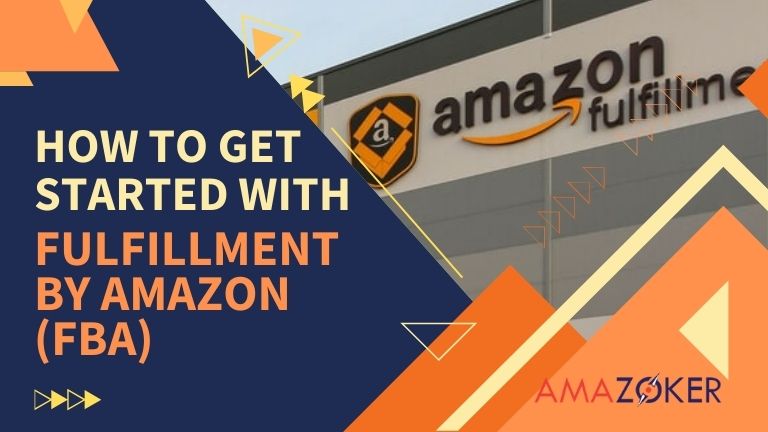
Source: https://amazoker.com/fulfillment-by-amazon/
Are you considering selling products on Amazon but don’t want the hassle of storing, packing, and shipping them yourself? Fulfillment By Amazon might be the solution for you. This guide will equip you with the knowledge and strategies you need to make the most of Fulfillment By Amazon and drive your online business to new heights.
What is Fulfillment By Amazon?
Fulfillment By Amazon, commonly referred to as FBA, is a service offered by Amazon that enables sellers to store their merchandise in Amazon’s fulfillment centers. Once a customer places an order, Amazon takes care of the picking, packing, and shipping of the products to the customer. In addition, Amazon also handles customer service and returns for the orders fulfilled through FBA. This means that sellers can focus on growing their business while Amazon takes care of the logistics.
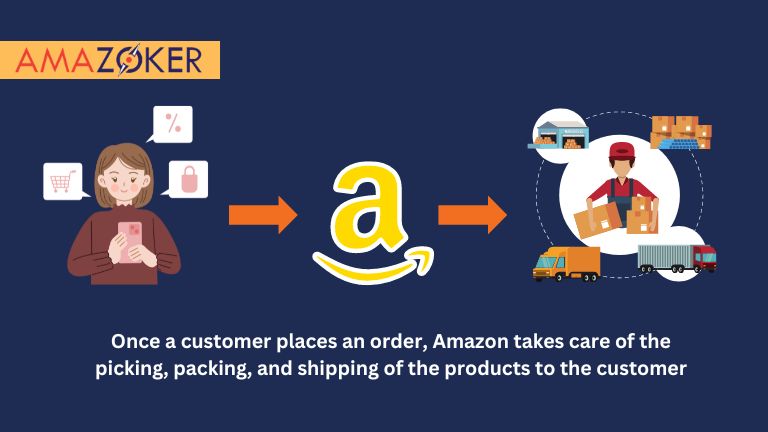
The definition of Fulfillment By Amazon
How does Fulfillment By Amazon work?
Fulfillment By Amazon (FBA) works in a straightforward and efficient manner. Here’s a step-by-step breakdown of how FBA operates:
- Product Storage: Sellers send their products to Amazon’s fulfillment centers, where they are stored securely until an order is placed.
- Inventory Management: Amazon handles inventory management, tracking the quantity and condition of each item in their fulfillment centers.
- Order Placement: When a customer places an order for a product fulfilled by Amazon, the order is automatically processed.
- Pick, Pack, and Ship: Amazon’s fulfillment center staff picks the ordered item from the inventory, packs it securely, and ships it to the customer’s address.
- Shipping and Delivery: Amazon uses its extensive logistics network to ensure fast and reliable shipping to customers. They may utilize their own delivery services or third-party carriers.
- Customer Service: Amazon provides customer service support for FBA orders, handling inquiries, returns, and any issues that may arise during the delivery process.
- Fees and Payments: Amazon charges sellers fees for FBA services, including storage fees and order fulfillment fees. Sellers are typically paid by Amazon every two weeks for their sales, minus the applicable fees.
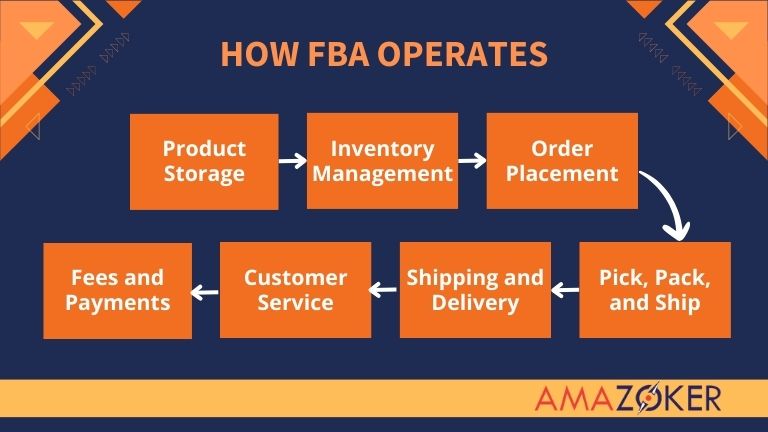
Comprehensive breakdown of the operational process of FBA
This streamlined process allows sellers to offload the logistical aspects of their business, freeing up time and resources to concentrate on other aspects of their operations.
What benefits can Fulfillment By Amazon bring?
Next, let’s discover the numerous advantages of using Fulfillment By Amazon for your business. We will also explain why choosing FBA can give you a competitive edge in the online marketplace.
Benefits of Fulfillment By Amazon?
There are several benefits associated with using Fulfillment By Amazon.
- Access to a Vast Customer Base: By leveraging Amazon’s platform, FBA sellers gain exposure to millions of potential customers. This broad customer base can help increase sales and brand visibility.
- Prime Shipping: FBA products are eligible for Prime shipping, which offers fast and reliable delivery. Prime members tend to prioritize Prime-eligible products, increasing the chances of making a sale. This can also lead to higher customer satisfaction and repeat purchases.
- Buy Box Advantage: Products fulfilled by Amazon are more likely to win the Buy Box, which is the default purchasing option for customers. Securing the Buy Box not only improves visibility but also maximizes the potential for a successful sale.
- Customer Service and Returns: Amazon is responsible for managing customer service and processing returns for FBA orders. This takes the burden off sellers, allowing them to focus on other aspects of their business. Amazon’s reputation for excellent customer service can enhance the overall customer experience and build trust in the brand.
- Fulfillment and Logistics Expertise: Amazon’s fulfillment network is highly efficient and reliable. FBA sellers benefit from Amazon’s expertise in inventory management, picking, packing, and shipping, ensuring orders are processed and delivered smoothly.
- Scalability and Operational Efficiency: FBA allows sellers to scale their business without worrying about inventory storage and fulfillment logistics. Amazon’s fulfillment centers can handle large volumes of inventory, saving sellers time and effort.
- Global Expansion: FBA enables sellers to expand their business globally without the need for establishing their own international fulfillment infrastructure. Amazon handles international shipping and customs requirements, making it easier to reach customers in different countries.
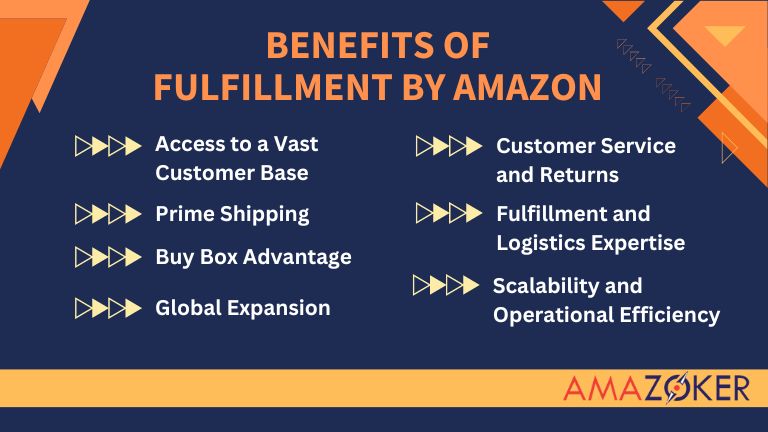
There are many benefits associated with using Fulfillment By Amazon
Why should you choose Fulfillment By Amazon?
Choosing Fulfillment By Amazon can be advantageous for businesses of all sizes. Whether you are a small-scale seller looking to expand your reach or a larger enterprise seeking to streamline your operations, FBA offers a range of benefits. By leveraging Amazon’s infrastructure and expertise, sellers can scale their business without having to invest in additional warehousing, logistics, or customer service resources. This can result in cost savings and improved efficiency, allowing businesses to focus on growth and innovation.
Limitations when doing business on Amazon FBA
While Fulfillment By Amazon offers numerous advantages, it is important to be aware of the potential limitations.
- Loss of Control: When using FBA, sellers give up some control over the storage, packaging, and shipping of their products. This means they have limited influence over the customer experience and branding.
- FBA Fees: FBA charges various fees, including storage fees, order fulfillment fees, and additional charges for services like labeling or prep. These fees can significantly impact profit margins, especially for low-priced or low-margin products.
- Product Restrictions: Amazon has strict guidelines and restrictions on certain products, such as hazardous materials or restricted brands. Sellers must ensure their products comply with these guidelines to avoid issues or account suspension.
- Competition: With a vast number of sellers on Amazon, the competition can become highly competitive. It can be challenging to differentiate products and stand out among similar offerings, especially in popular categories.
- Long-Term Storage Fees: FBA charges long-term storage fees for inventory that remains unsold for a long time. This can be a concern for sellers with slow-moving products or seasonal items.
- Returns and Refunds: While FBA handles returns and refunds, sellers may experience higher return rates compared to fulfilling orders themselves. This can impact profitability and require additional management.
- Dependence on Amazon: Relying solely on Amazon for fulfillment means sellers are dependent on Amazon’s systems, processes, and policies. Any disruptions or technical issues on Amazon’s end can affect order processing and delivery.
- Seller Performance Metrics: FBA sellers are subject to Amazon’s performance metrics, such as on-time delivery and customer feedback. Falling below the required thresholds can result in account suspension or other penalties.
It is essential for sellers to carefully evaluate their product offerings and sales volume to determine if FBA is the right choice for their business.
What types of costs are included in Fulfillment By Amazon sales?
When utilizing Fulfillment By Amazon, sellers should consider the various costs associated with the service. These costs can include storage fees, order fulfillment fees, and other expenses.
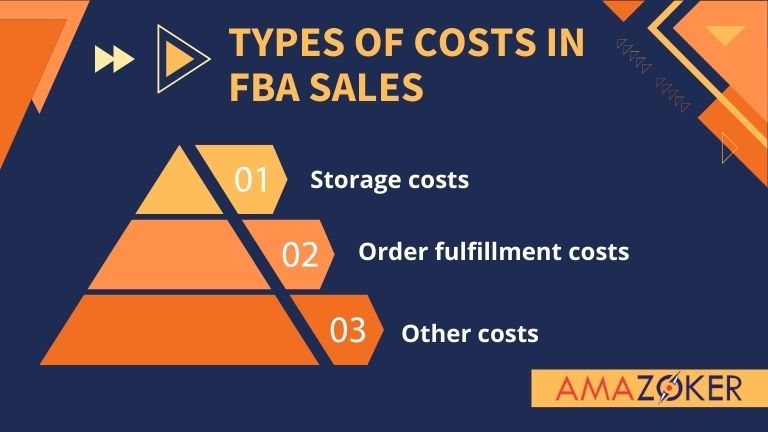
Three types of costs are included in Fulfillment By Amazon
Storage costs
Sellers are required to pay fees to Amazon for the storage of their products in the company’s fulfillment centers. The storage fees are calculated based on the volume of space the products occupy and the time they are stored. It is important for sellers to manage their inventory effectively to minimize storage costs and avoid long-term storage fees for slow-moving products.
Order fulfillment costs
In addition to storage fees, sellers are also charged for order fulfillment, which covers the picking, packing, and shipping of products to customers. The fulfillment fees are determined based on the size and weight of the products, as well as the shipping destination. Sellers should factor these costs into their pricing strategy to ensure profitability.
Other costs
Apart from storage and fulfillment fees, sellers may also incur additional costs related to FBA, such as inbound shipping charges for sending products to Amazon’s fulfillment centers, removal fees for unsold inventory, and return processing fees. It is crucial for sellers to understand and account for these costs when evaluating the financial viability of using FBA.
Fulfillment By Amazon is a valuable service that offers sellers the opportunity to streamline their operations, reach a wider audience, and enhance the customer experience. By following the steps outlined in this guide, you can confidently embark on your FBA journey and unlock the potential for exponential growth in your business. While FBA may not be suitable for every seller or product, it has proven to be a game-changer for many businesses seeking to thrive in the competitive e-commerce landscape.
Comments
Post a Comment